
ZERO HUNGER
Nitte (Deemed to be University)'s SDG 2 Zero hunger report highlights a range
of initiatives aimed at addressing hunger and enhancing food security through
practical and sustainable approaches. These initiatives reflect the commitment
to making improvements in community well-being and nutritional access with
local solutions to hunger, providing essential support to institutions in need.
Simultaneously, scientific innovations demonstrate how research can contribute
to healthier food alternatives that are also environmentally sustainable.
The university's focus on food safety through research highlights its dedication
to ensuring the quality and security of global food supplies. These initiatives not
only address current challenges but also lay a foundation for long-term food
security through education and community engagement.
Eradicating Hunger:
Rice Donation Drive by Annadaana Club NMAMIT
In celebration of National Rice Month on Monday, 23 October 2023, the Annadaana Club under Abhyuday - Department of Counselling Welfare Training & Placement NMAMIT conducted a community outreach program to fight hunger in the Karkala region. The name "Annadaana'' means "Donating Rice," which was fitting as the club collected an impressive 400 kilograms of rice. They distributed this equally among four deserving institutions: Devditha Old Age Home, Chetana Special School, Vijetha Special School, and Suraksha Seva Ashram. This initiative helped reduce hunger among the residents, ensuring they had access to nutritious meals. By addressing food insecurity, the Annadaana Club promoted food security and community involvement, emphasizing sustainable food donation practices that could be replicated elsewhere
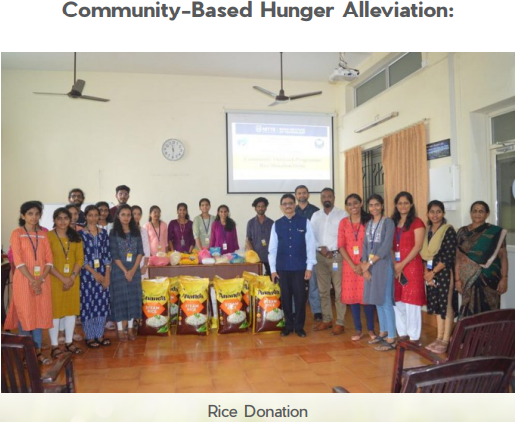
RESEARCH ON ACHIEVING FOOD SECURITY
Enhancing Nutritional Security:
Development of Millet Milk-Based Probiotic Product Dr. Feby Luckose from NUCSER, funded `130000 under Project ID N/RG/NUFR2/NUCSER /2023/05 (NUFR-23-033), developed a millet milk-based probiotic product. Millet, being a nutritious and droughtresistant grain, combined with probiotics, enhanced its health benefits. The goal was to create an affordable and nutritious food product to address malnutrition and improve food security, especially in regions prone to food scarcity.
Functional Food Development:
Soybean Derived ACE-I Inhibitory Instant Soup Mix to Combat Hypertension Nishith Kumar and Dr. Mamatha BS from NUCSER, funded ` 561827 under Sanction Letter No. 3/1/2/216/2021-Nut, developed a soybean-based instant soup mix that acted as an ACE-I inhibitor to help combat hypertension. Hypertension could lead to severe complications like heart disease and stroke. The project aimed to formulate an instant soup mix using soybean, evaluate its effectiveness in reducing hypertension, and promote it as a nutritious and functional food option. This initiative contributed to SDG 2 by enhancing access to nutritious food and promoting sustainable agriculture. By creating a functional food that addressed a common health issue, the project supported long-term health and wellness.
Improving Food Safety:
Isolation and Determination of Antibiofilm Activity of Bacteriophage Against Burkholderia Species Researcher Mr. Preetham Nayak from NUCSER, with funding of ` 10000 under Project ID N/RG/NUSR2/NUCSER/2023/16 (NUSR2-23-128), focused on isolating bacteriophages to target and disrupt biofilms formed by Burkholderia species. Biofilms contributed to the persistence and resistance of bacteria in various environments, including food processing facilities. By combating these biofilms, the project aimed to improve food safety and reduce the risk of bacterial contamination, directly contributing to ensuring food security and safe consumption. By tackling bacterial contamination, this project supported sustainable food safety practices.
Rapid Detection of Foodborne Pathogens:
Phage-Protein Conjugated Quantum Dots for the Detection of Salmonella and Escherichia coli in Food Dr. Juliet Roshini Mohan Raj from NUCSER, with a funding of ` 125000 under Project ID N/RG/NUFR2/NUCSER/2023/06 (NUFR-23-038), aimed to develop a detection system for Salmonella and Escherichia coli in food using phage-protein conjugated quantum dots. Rapid and accurate detection of these pathogens was essential for ensuring food safety. By improving food safety measures, this project contributed to reducing foodborne illnesses and enhancing the overall security of food supplies, which was crucial for SDG 2. Ensuring quick and reliable detection methods helped maintain sustainable food safety standards
Sustainable Aquaculture Practices:
Biotechnological Approaches for Prevention and Control of Fish Disease in Aquaculture (BIOAQUA) The project led by Biswajit Maiti, co-PIs Dr. Indrani Karunasagar and Dr. Anirban Chakraborty, from NUCSER, and sanctioned ` 4656500 by the India-Norway Collaborative Project, Department of Science & Technology (DST), Government of India, aimed to address fish disease in aquaculture through biotechnological interventions. With ` 1000000 received in 2023-2024, the project focused on developing tools and methods to prevent and control fish diseases. By enhancing aquaculture systems' sustainability and productivity, and reducing antibiotic dependency, the project contributed to SDG 2 by promoting sustainable food production systems and resilient agricultural practices. By improving fish health, it supported the sustainability of aquaculture industries.
Mitigating Food Source Contamination:
Exploring the Association of Microorganisms with Microplastics in Aquatic Environment Dr. Rajeshwari Vittal from NUCSER, funded ` 100000 under Project ID N/RG/NUFR2 /NUCSER/2023/08 (NUFR-23-031), investigated the interaction between microorganisms and microplastics in aquatic environments. Understanding these interactions was crucial for assessing the impact of microplastics on marine life and food safety. By addressing the contamination of marine food sources, this research contributed to the broader goal of ensuring food security and the sustainability of aquatic food resources. By highlighting the environmental impact of microplastics, the project supported sustainable marine ecosystems.
Addressing Aquatic Ecosystem Health:
Harmful Algal Bloom (HAB) Mitigation Through Phyto-Symbionts: A Field to Laboratory Research Researcher Ms. Mehak Altaf Sheikh from NUCSER, funded ` 10000 under Project ID N/RG/NUSR2/NUCSER/2023/14 (NUSR2-23-131), worked on mitigating harmful algal blooms (HABs) using phytosymbionts. HABs harm aquatic ecosystems and could severely impact fisheries and aquaculture, leading to food insecurity. By exploring natural mitigation strategies, the project sought to protect aquatic food sources and ensure sustainable food production, aligning with the objectives of SDG 2. By employing natural solutions, it promoted the sustainability of aquatic environments.

IMPROVED NUTRITION
Promoting SDG 2 through Maternal and Child Health Education:
The Janani Aarogya Programme:
On February 21, 2023, the Department of Public Health at NITTE (Deemed to be University) collaborated with the Kotekar Pattana Panchayat of Dakshina Kannada to organize the Janani Aarogya programme. This initiative aimed to educate parents of Aanganwadi children in the Kotekar village on maternal and child health and nutrition, aligning with Sustainable Development Goal 2 (SDG 2) - Zero Hunger. The session aimed to enhance participants' understanding of nutrition, which was evaluated through a pre- and post-session quiz. By focusing on maternal and child health, the Janani Aarogya programme directly contributes to SDG 2 by addressing nutrition-related challenges at the grassroots level. This educational initiative helps ensure that mothers and children receive the knowledge necessary for proper nutrition, fostering healthier communities and reducing hunger and malnutrition.
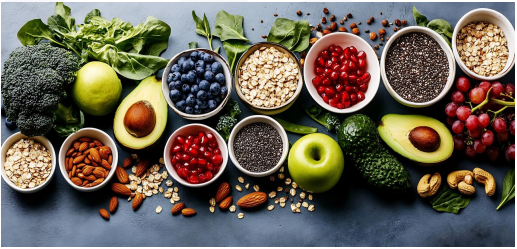
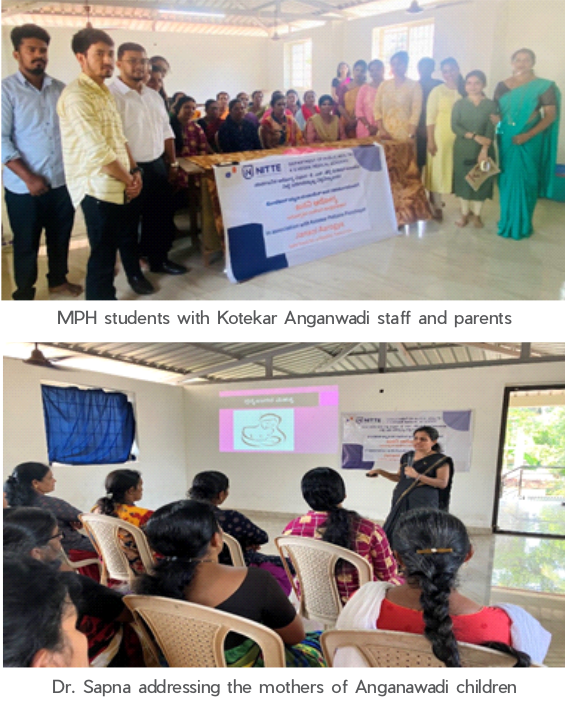
Advancing SDG 2 through Innovative Food Technology:
On 20th April 2023, Master of Public Health students from KSHEMA, NITTE (Deemed to be University), visited the Central Food Technological Research Institute (CFTRI) in Mysuru. The visit aimed to deepen the students' understanding of nutrition, food technology, and current public health issues in India. The visit began with an introductory talk by a senior scientist at CFTRI, who provided insights into the institute's history and its multidisciplinary research activities focused on improving public health. Students explored a showcase of CFTRI's contributions to technological advancements and societal outreach. A tour of the "Food Safety and Analytical Quality Control Laboratory" allowed students to understand the operations and tests conducted to ensure food safety, highlighting the importance of standard operating procedures and precision instruments. The visit highlighted the role of interdisciplinary collaboration within CFTRI, highlighting how different departments work together to tackle complex food research and development challenges. This approach fosters innovation, creates new food products, and identifies sustainable solutions, aligning with Sustainable Development Goal 2 (SDG 2) of achieving zero hunger.

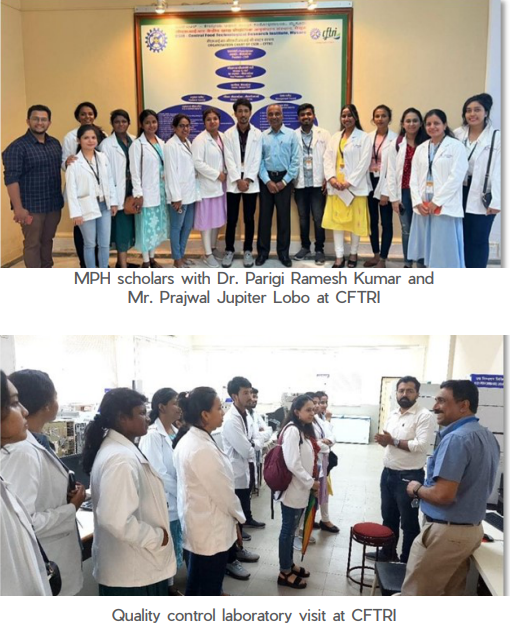
Promoting Nutritional Education:
"Nutrimission!" Initiative by MPH 1st-Year Scholars of KSHEMA On Monday, 29 September 2023, the MPH 1st-Year Scholars of the Department of Public Health KSHEMA organized the "Nutrimission!" initiative at Government Higher Primary School, Nadupaduva, Mangaluru. The term "Nutrimission" signified a mission to promote nutrition. The initiative aimed to empower young minds with nutritional awareness, targeting 57 children from Class 1 to 7th Std. Through educational games, nutritional activities, and interactive sessions, children learned about healthy eating habits and the importance of a balanced diet.
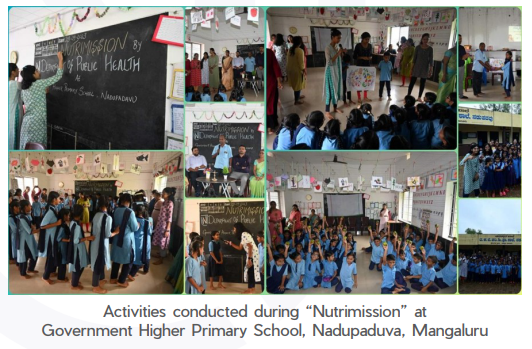
Enhancing Food Security and Nutrition: NIHS Celebrates International Hospitality Day:
On April 26, 2023, NIHS celebrated International Hospitality Day, emphasizing both industry insights and community engagement in line with Sustainable Development Goal 2 (SDG 2) - Zero Hunger. The event featured an online talk by Chef Jomon, an alumnus currently with The Lalit in London, who discussed the challenges and essential attitudes for a successful career in hospitality. Additionally, Chef Amal, Executive Chef of The Lalit Spa & Resorts, Bekal, Kasargod, conducted a hands-on practical session in the Advanced Training Kitchen, enriching students' industry experience. A significant highlight of the event was the Social Outreach Program, where first-year BSc (Hons) Hospitality Management students visited Veronica Vihar Ashram in Mary Hill, Mangalore.

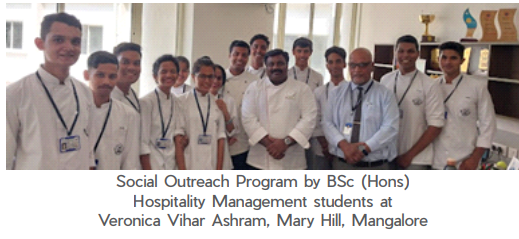
Promoting Food Security and Diversity:
On 15th July 2023, the Nitte Institute of Hospitality Services (NIHS) celebrated ‘Aatidonji Dina,’ a vibrant event that highlighted cultural and culinary highlights. Traditional games like Bite the Tomato and Grating the Coconut, along with cultural performances such as Yakshagana and the folk dance 'Pili Nalike,' highlighted Mangalore’s rich heritage. A significant aspect of the event was the traditional meal served on banana leaves, featuring Mangalore’s popular dishes such as Pathrode and Kukkuda Rasa, and concluding with a sweet Moongdal Payasam. This culinary experience not only celebrated local culture but also aligned with Sustainable Development Goal 2 (SDG 2) - Zero Hunger. By promoting food diversity and demonstrating sustainable food practices, NIHS contributes to food security and the promotion of nutritious, culturally significant foods. This event underscores the university's commitment to sustainable development and its role in fostering a community that values and practices sustainable food consumption.

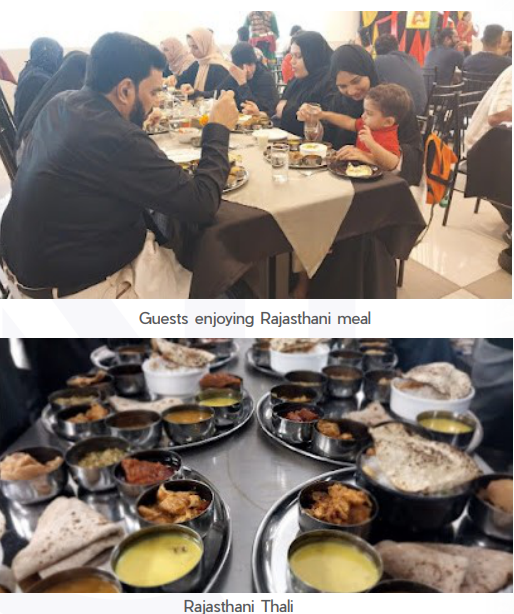
PROMOTING MATERNAL AND CHILD NUTRITION THROUGH WORLD BREASTFEEDING WEEK 2023
Mass Health Education Program on 'Breast Feeding':
The Department of Child Health Nursing, NUINS, conducted a Mass Health Education program at Shri Kshetra Dharmasthala Rural Development Project office, Falnir, Mangaluru. Dr. Sharlet Dsouza, Assoc. Professor, delivered health education on breastfeeding techniques, addressing the participants' queries. The program benefited 203 women and involved 10 students and 2 faculty members from NUINS.

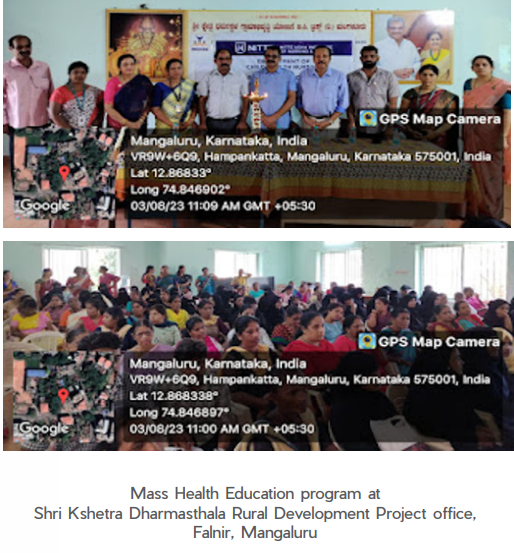
Health Education Program on "Breastfeeding":
The Department of Community Medicine, KSHEMA, organized a health education program at the Epidemiological unit of K.S Hegde Hospital. Coordinated by Mr. Ravi, MSW, and conducted by Dr. Chilakala (Intern) and Dr. Monisha (Postgraduate) under the guidance of Dr. Rahul Hegde, the program aimed to raise awareness about the benefits of breastfeeding.

Mass Health Education Program on Breastfeeding:
NUINS conducted another Mass Health Education program at Shadi Mahal, Bolar, Mangalore. Health talks were given by Mrs. Jeevitha Alva, Asst. Professor, and Prof. Sujatha R of NUINS, who explained breastfeeding techniques and the importance of storing breast milk. The program benefited 132 women, and toys and coloring books were distributed to Anganwadi children.
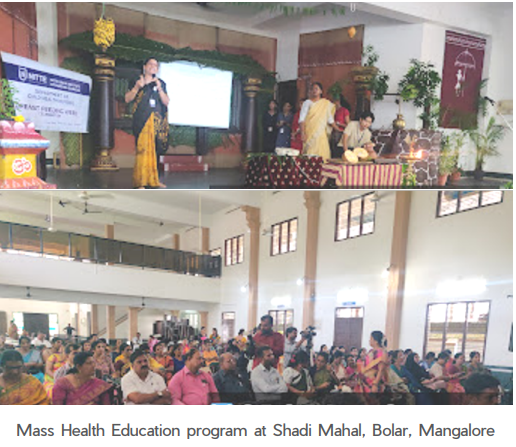
Enabling Breastfeeding - Making a Difference for Working Parents:
The Department of Paediatrics, KSHEMA organized a program with the theme "Enabling Breastfeeding - Making a Difference for Working Parents” on the occasion of the 'World Breastfeeding Week' (1-7 August 2023) at KS Hegde Hospital. The undergraduates and postgraduates actively participated in Street play, Poster competition and a Panel discussion on the challenges faced by working parents in continuing breastfeeding.
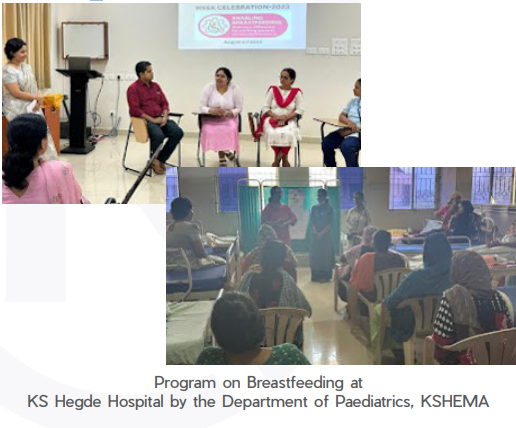
Importance of Nutrition for Healthy Living:
On 7th September 2023, the Women's Forum at ABSMIDS hosted a guest lecture titled "Importance of Nutrition for Healthy Living." This event, led by Prof. (Dr.) Chethan Hegde, HoD of Prosthodontics, emphasized the crucial role of nutrition in supporting health and wellbeing. The lecture, delivered by Ms. Bhavyalakshmi G, a Dietitian from Justice K S Hegde Charitable Hospital, focused on balanced diets and part control, educating 83 attendees on the importance of proper nutrition.
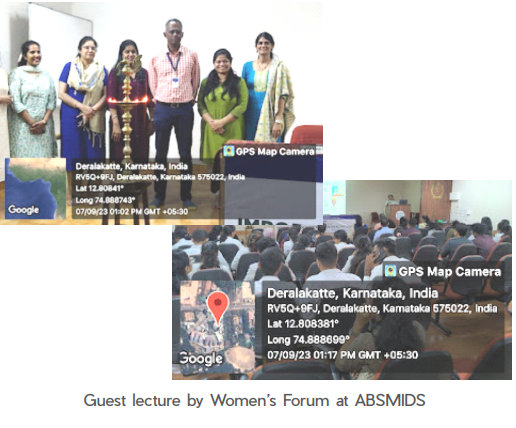
PROMOTE SUSTAINABLE AGRICULTURE
Advancing Sustainable Agriculture and Food Security through Practical Learning:
On 16th October 2023, students from I & II MSc (Marine Biotechnology), II MSc (Biotechnology), and II MSc (Food Safety & Biotechnology) programs at Nitte University visited the Karnataka Fisheries Development Corporation Limited (KFDC Ltd.) and Central Marine Fisheries Research Institute (CMFRI). This educational visit, integral to their bioprocess technology curriculum, exposed students to various fish processing techniques for export, the creation of value-added fish products, and the use of specialized processing equipment. Facilitated by Dr. Shubha JR, Dr. Neetha Nirupam, and Mr. Prithvisagar, the visit significantly enhanced the students' practical understanding of fish processing and export practices. By integrating such hands-on learning experiences, Nitte University actively supports Sustainable Development Goal 2 (SDG 2) - Zero Hunger. The initiative underscores the university's commitment to promoting sustainable agriculture and food security, aligning with global efforts to end hunger and improve nutrition through education and practical application.
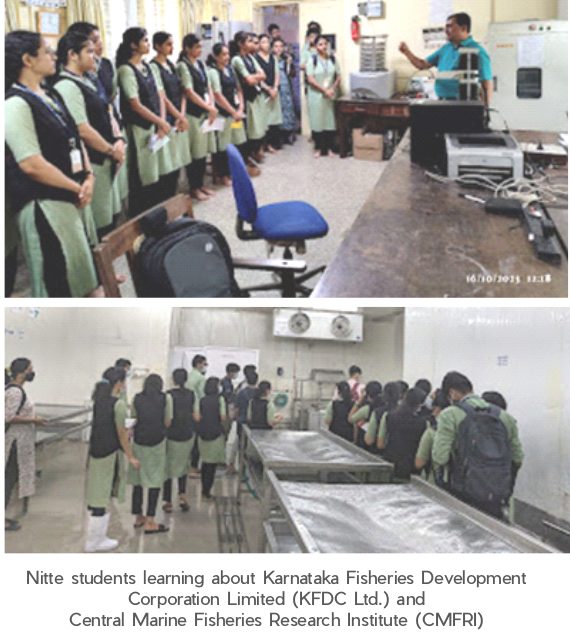
Read more: https://aboutnitte.blogspot.com/2023/11/news-from-nucser-visit-to-kfdc-and-cmfri.html
Publications at Nitte:
Nitte University is committed to advancing the United Nations Sustainable Development Goal 2 (SDG 2) - Zero Hunger, through impactful research and innovation. Its recent publications reflect significant contributions towards SDG 2, "Zero Hunger," by addressing various critical aspects of agriculture, nutrition, and sustainable resource management. The research spans innovative technological advancements, such as the development of a solar-powered multifunctional agricultural robot for improved crop management, and the application of machine learning techniques for seed quality assessment, which can enhance food production efficiency. Additionally, studies on antimicrobial resistance in fish pathogens and insect-based aquaculture feed offer sustainable solutions to global food security challenges. Nutritional studies, including the impact of astaxanthin and DHA supplementation on undernutrition and protein malnutrition models, provide valuable insights into combating malnutrition. Phytoremediation and pesticide metabolism research further emphasize sustainable agricultural practices, promoting environmental health and safety. Collectively, following publications highlight Nitte University's commitment to fostering innovation and sustainable practices to achieve zero hunger and ensure food security for all.
UG Projects Academic year 2023-24:
The undergraduate projects undertaken at Nitte University in the academic year 2023-24 reflect a strong commitment to SDG 2 by integrating advanced technologies such as IoT, machine learning, and AI into agricultural practices. These projects aim to enhance crop protection, disease detection, and resource management, thereby improving food security and promoting sustainable agricultural practices. The focus on innovative solutions for monitoring and managing agricultural systems demonstrates the university's dedication to fostering sustainable development and addressing global hunger challenges.
Title of the Project
- Iotagrosense: An Integrated Agricultural Monitoring System with Advanced Sensing, Machine Learning, Image Processing, and Mobile Application Support with Web-Based Management.
- Sugarcane Crop Protection from Animals using Deep Learning
- Agrivision:Deep CNNs for wild animal surveillance in farms
- Animal Monitoring and Threat Detection in Farm Environment
- Fabrication of a Sustainable Biocomposite Using Lab Grown Oyster Mushrooms, and a Review on its Applications
- Study of Efficacy of Hydrogel in Soil Water Retention and Plant Growth
- Predicting And Classifying Potato Leaf Disease Using Deep Learning Networks
- Smart Terrace Garden System
- A novel Fish Classification System using Deep Learning Algorithm
- Potato Disease Detection using Machine Learning
- Plant Health App
- Bitter Gourd Leaf Disease Detection
- Crop Management System


.png)
